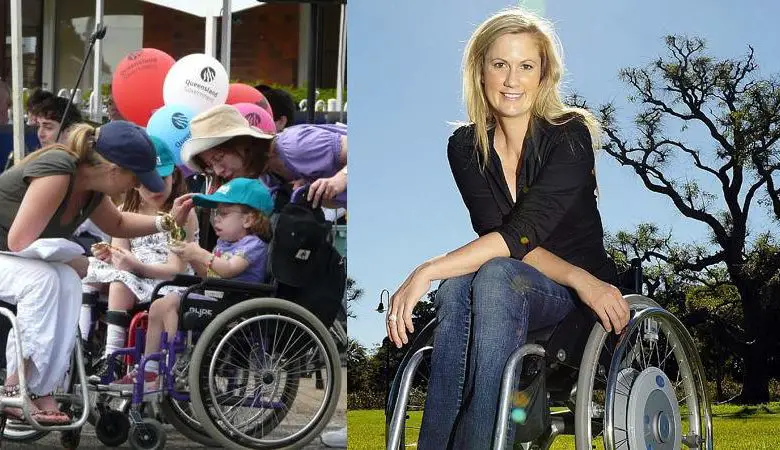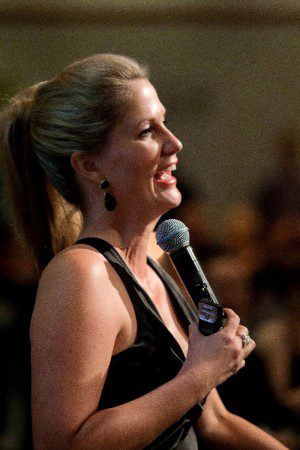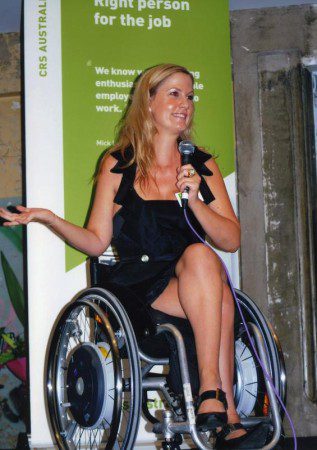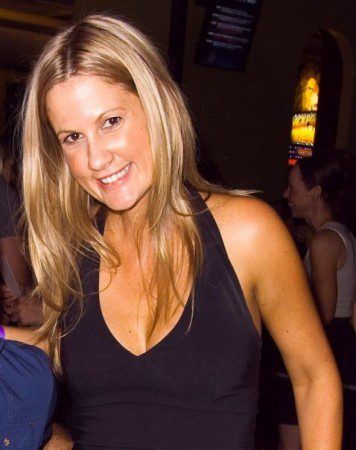
Paralympic athlete Karni Liddell’s journey
Paralympic athlete, Karni Liddell, recounts her childhood and how her parents (as well as life struggles) have pushed her to achieve not only success as a Paralympian, but to be happy and fulfilled in life.
It may seem odd that a person who holds a double degree in communications and has spent 12 years on the keynote speaking circuit would find answering the question “so, what do you speak about?” extremely difficult to answer. I usually say my journey to the Paralympics, but Reality TV has ruined the word journey!
 I know for sure that I love to speak and I truly love people and this is why I have embarked on a gruelling Masters in Clinical Social Work, which has seen me complete 1,000 hours of a placement at the Mater Children’s Hospital.
I know for sure that I love to speak and I truly love people and this is why I have embarked on a gruelling Masters in Clinical Social Work, which has seen me complete 1,000 hours of a placement at the Mater Children’s Hospital.
I am specialising in trauma and diagnosis counselling, and when I tell people what I’m doing I am typically shocked by their responses, which range from “wow aren’t you noble,” to “God why would you want to do that” or “I couldn’t think of anything worse.”
Now, you may think that hearing these responses may deter me from my new adventure, however living with a disability and using a wheelchair I have become accustomed, and desensitised to people’s comments, observations and stares.
I was born with my disability, a degenerative muscle wasting disease called Spinal Muscular Atrophy. My phenomenal parents were told when I was 12 months old that their first born child with big brown eyes and beautiful blonde hair would not walk, crawl or live past her teenage years.
My incredibly calm, athletic (he still cycles around 100km a day at the age of 60), respected father Jeff asked many specialists about rehabilitation and exercise as this was his attitude on life. He was told exercise would only make my condition deteriorate faster, so all they could do was make me as comfortable as possible and that there are institutions that could assist with this.
When my parents had me at the age of 25 there was little information on disability – Google didn’t exist back then. None of their friends knew what to say or even how to pronounce my disease. In fact, still to this day, 33 years later, most GPs, specialists and even some of my friends think I have MS.
 My parents dedicated every moment of their lives to improving mine, and they still do. They started me on what I lovingly call a ‘crazy’ rehabilitation program – ‘crazy’ because every specialist with an education warned them not to do it. This rehab program included swimming, horse riding, trampolining, in fact any activity they could get me involved in that would get me moving.
My parents dedicated every moment of their lives to improving mine, and they still do. They started me on what I lovingly call a ‘crazy’ rehabilitation program – ‘crazy’ because every specialist with an education warned them not to do it. This rehab program included swimming, horse riding, trampolining, in fact any activity they could get me involved in that would get me moving.
At the stage when I would have been learning to walk, when I wasn’t even able to roll over or reach for a rattle, my mother hired a wooden standing frame which she strapped me into to force my body to stand up. Parents will understand that strapping a 2 year old into anything is impossible and maybe illegal, so they tried every parent trick to keep me entertained whilst I cried in pain and confusion.
So after many days of relentless tantrums, my father disappeared into the back shed for a few days without any explanation and came back into the house with this standing frame mounted onto a wheelbarrow-type contraption. It was painted green with little flowers on it and resembled a home-grown pram whereby the baby stood up in instead of relaxing in! My mother and father pushed me around on this for up to 6 hours a day, 7 days a week. It worked and I walked at the age of 3!
This was my parent’s greatest day and their sweetest taste of success. My parents will not bore you with stories of my Paralympic achievements, but this story has been told at every family function for the past 30 years and the most hilarious part is that each member of my extended family claims to have been there on this day. The truth is that it was just my parents and I in the living room on the brightest day of my life. This day gave my parents the greatest gift you can give anybody and that is hope.
All of a sudden they realised that exercise did work and maybe, just maybe, I could do more than just walk, maybe I could live. My parents never had any grand dreams of me being successful or a Paralympian, they just wanted me to live, be happy and to be healthy.
My father’s philosophy on my disease is that “if she is only going to be here for a short time, let’s give her the best possible time.” And that is how I have lived my life, I am always the last woman standing at any party, I always dance more than anybody else, travel more and laugh more.
I am extremely fortunate that the only reason I am here today living, walking (I use a BMW type wheelchair for longer distances), dancing (only after 5 vodkas!), laughing, working, and speaking is because of my parents. I may have won the muscle disease lottery, but I also won the parents lottery.
 My journey has been challenging, phenomenal, tremendous, unfair, miraculous, fortunate and enviable. But most of it has been because I have chosen to fight. People often tell me now that I am lucky because I have competed at many Paralympic Games, won medals, broken world records, I’m paid to speak, I’m a radio broadcaster, I was the Sydney 2000 Australian team captain, and I am the only person in a wheelchair to be on the cover of Inside Sport in a bikini (don’t tell my dad!). In many ways I am lucky, but in most ways I have landed here because I made a choice in life to be happy, healthy, grateful, generous and tough.
My journey has been challenging, phenomenal, tremendous, unfair, miraculous, fortunate and enviable. But most of it has been because I have chosen to fight. People often tell me now that I am lucky because I have competed at many Paralympic Games, won medals, broken world records, I’m paid to speak, I’m a radio broadcaster, I was the Sydney 2000 Australian team captain, and I am the only person in a wheelchair to be on the cover of Inside Sport in a bikini (don’t tell my dad!). In many ways I am lucky, but in most ways I have landed here because I made a choice in life to be happy, healthy, grateful, generous and tough.
I live in pain and I have had 6 reconstructive surgeries. But I believe that we all have a choice in life and that our choices should not be determined by our life circumstances, our bodies, the colour of our skin, our families or even by where we were born.
I learnt this not only from my fantastic journey, but also from watching a Chinese swimmer without arms stand behind the starting blocks for the 200m Individual Medley at the Atlanta Paralympics, put his cap and goggles on with his feet, jump up to the starting blocks, dive in and kick the whole way. At the completion of each lap he banged his head on the wall as he obviously was unable to touch with his hands.
This guy woke up one morning 4 years before this, found the courage to walk into a pool in China, walk up to an elite swimming coach and look him or her in the eyes and say aloud “I want to be a swimmer.” He had to find the strength to say out loud to another human being that he wanted to do something that he had never seen anybody do before him. This swimmer has now competed at 5 Paralympic Games.
I cannot control my disease, or when my next operation is going to be, or the economy or our politicians or when my iPhone is going to break… I learnt from my disease, and my body, that the only thing any of us have control over is our attitude and how we handle our darkest moments.
Live, laugh, love and appreciate your health!
By Karni Liddell
Check out our Sport section for more stories like this. We’d love to know about your sporting and life achievements. Email us at editor@disabilityhorizons.com, tweet us at @DHorizons or message us on Facebook.

Brilliant article – and rings so true. Thank you 🙂
Good article, but I’d like to see the Inside Sport Cover 🙂 Oh, wait, here’s a good one… http://bit.ly/KM1Gbm
Karni u r amazing!!! altho we dont c each other often im so proud to call u my friend. i only wish i could have led my life more like u… i still to this day dont know as much as i should about my disability. you really are an inspiration. xx
It’s amazing how much a positive outlook can be shaped by parents. It’s great to hear how Karni’s parents have been so supportive. Understanding, acceptance and love it what is needed, for any child.